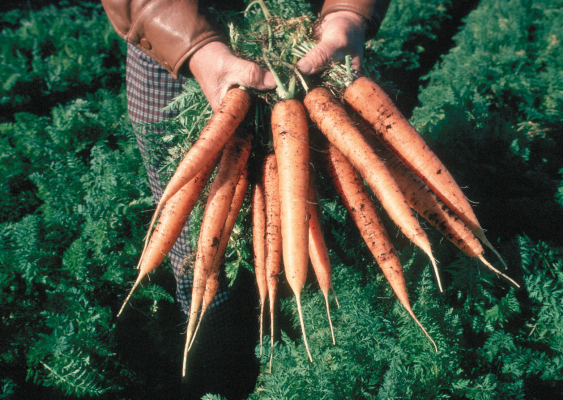Community gardens are all the rage in our town.
Of course, there’s the whole political battle between CPR and the City of Vancouver regarding the Arbutus Corridor on the southwest side. $200 million? $80 million? $20 million? Nobody’s talking. Everything’s a big hairy secret, even if it is taxpayers’ money that’s being bandied about like we’re anteing up for the Friday night poker game at Bernie’s house.
For the moment, let’s leave all the arguments aside and just enjoy what we’ve got for as long as we’ve got it, kids.
There is something basic, elemental and ancient about this joy. It’s probably in our DNA. We muck about in the dirt and then a month or two or five later — surprise — green, yellow and red stuff we can eat! Some are purple and some are tiny. Others are gigantic. These little guys we can eat just as they are; these other characters are even better after they spend a few minutes in boiling water. I add a swab of butter to these and she likes just a pinch of salt on those. Our neighbour puts Dijon mustard on practically everything he grows. Go figure.
One could argue (but who would want to listen?) that so much land mass has been seized by agriculture that there is barely a square inch left to enjoy. Or that more carbon dioxide and methane and other killer pollutants flow forth into our besieged environment as a result of our efforts to keep the food supply chain going.
Still, at any given moment, 850 million human beings are hungry.
Yes, you could point out these and other unsavoury and disturbing facts (that land not given to agriculture is more often than not used for grazing, which geometrically increases the polluting strains on our air and oxygen), but none of these points will stop those of us in cities and towns from the desire to grow something and eat something fresh as a result of our own sweaty, back-aching toil.
There is a particular stretch of several blocks right in the centre of the city where such gardens are not only flourishing; one can confidently say they are downright beautiful, gorgeous.
People (I think most are apartment dwellers) are growing tomatoes, several varieties of lettuce and kale, carrots, rhubarb and raspberries, and the widest possible range of flowers, exotic and otherwise.
On top of that, each warden of every modest plot seems to have created little, green outdoor “rooms,” replete with Adirondacks, benches, striped sling backs or plastic beach chairs.
There appears to be an unspoken, unwritten open invitation herein: “Take a load off, friend. Sit a moment. Smell, breathe. Close your eyes. Open them and see anew. If you have a sweetheart in hand, even a little old-fashioned spooning will be deemed acceptable. Put your child on your knee. Speak softly. Point out the explosion of the sunflower or the determination of the vine. You may have a cellphone in your pocket or bag, but for these few moments, pay it no mind.”
What random acts of kindness! What sweet reasonableness. What forethought for the weary stranger.
It would be too easy to drive or hurry by these community gardens and dismiss them as some leftover hippy-dippy conceit. Oh, these nuts are just living out some rural fantasy that we’ll never see again. That kind of life is over; it’s done.
What are they trying to be, my grandmother? Can’t they buy their eats at the supermarket like the rest of us? They never heard of division of labour?
But make no mistake. The guardians of these domains come from every age and belief system and demographic and style of dress and speech.
They are at once casual and dedicated, busy and committed.
As you absorb the homespun beauty of these gardens, remember the lyrics of Tom Jones set to the music of Harvey Schmidt in their 1960 musical hit The Fantastiks.
The show only ran for 42 years off-Broadway.
“Plant a radish; get a radish, never any doubt. That’s why I love vegetables; you know what they’re about.
“Plant a turnip, get a turnip. Maybe you’ll get two. That’s why I love vegetables; you know that they’ll come through!”
[email protected]
David Berner’s book on addictions, All the Way Home, is available at Amazon and davidberner.com. His new book of 365 inspirational tales is called Pick up the Pickle and will be published in early 2015.



